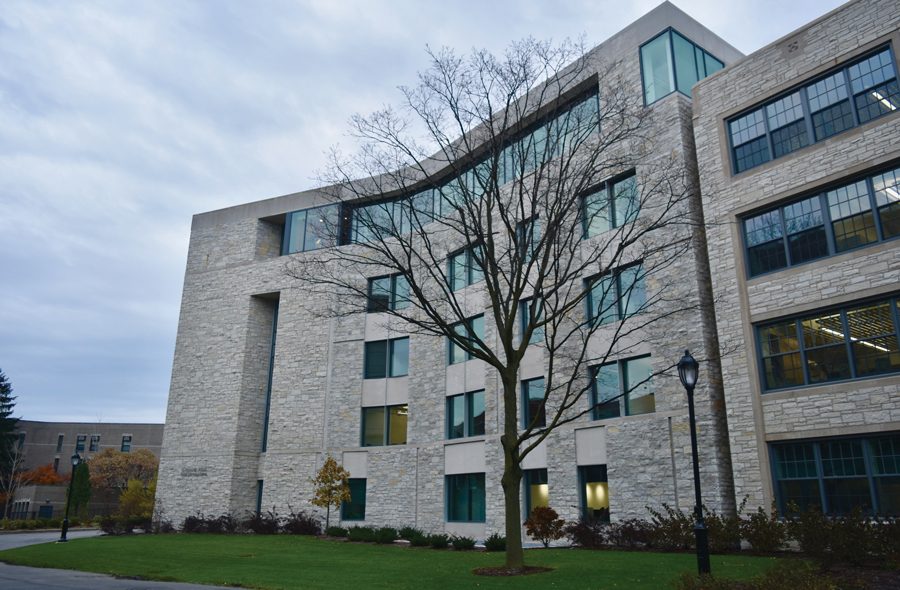MEChA, APAC members push for department status for ethnic studies
Daily file photo by Brian Meng
Crowe Hall, home of the African American Studies department. Faculty and affiliates sent an email to President Schapiro following his condemnation of student protests on Monday afternoon.
January 31, 2018
MEChA de Northwestern and the Asian Pacific American Coalition are leading a campaign for department status for two of the University’s largest ethnic studies programs.
Working together as the Latinx Asian American Collective, the student groups published a proposal last week urging the establishment of the Latina and Latino and Asian American Studies Programs as departments. As of Tuesday night, about 165 students had signed an online petition in support of the proposal.
The proposal echoes a Jan. 23 letter to the editor authored by the Collective, but it lays out reform measures for the programs in more detail.
In a statement to The Daily, the Collective said it is “necessary to establish (the programs) as fully funded and autonomous departments” as they continue to expand.
“By denying this demand, Northwestern would be neglecting the educational needs of its students of color, specifically those who are in these disciplines,” the statement said. “When you neglect Ethnic Studies, you neglect the people within these communities.”
The LLSP budget has not changed since 2011, and the AASP budget was increased last year for the first time in at least a decade, the programs’ respective directors said. The proposal states the lack of funding limits the programs’ abilities to support research projects and conference presentations in a growing field of study.
Additionally, their lack of departmental status means the programs are not able to hire tenure-track faculty to dedicate their time fully to ethnic studies, both directors said. Faculty members, including directors, have to balance positions in other departments, limiting time spent within the ethnic studies programs, said LLSP director and Spanish Prof. Frances Aparicio and AASP director and African American Studies Prof. Nitasha Sharma.
The lack of faculty also limits the number and variety of courses in a field committed to exploring the diverse experiences within communities of people of color, both the proposal and program directors said.
“It’s not where it needs to be,” Sharma, who also teaches Asian American studies courses, said. “That’s why we need Asian American studies to inform people about the diversity of Asian Americans.”
Weinberg Dean Adrian Randolph said in an email to The Daily that he has had “several informal conversations” with students and faculty about the programs and is “proud to have such strong interdisciplinary programs.”
“They play a significant role within our intellectual community,” he said. “The difference between a program or department is primarily a difference in administrative structure and scale; it does not in any way reflect the importance the University or the College attaches to a particular academic discipline or course of study.”
Since LLSP was founded in 2008, the number of students enrolled has grown from five to 44, Aparicio said. The AASP has grown from eight minors in 2006 to 32 majors and minors this year after the major was created in Feb. 2016, according to documents obtained by The Daily.
But the creation of the programs came only after years of student demonstrations, including a hunger strike in 1995 by members of the Asian American Advisory Board. Since then, students have pushed for various program expansions and criticized the perceived lack of respect and support from the University.
To combat these issues, the proposal urges the University to grant the programs departmental status, allowing them more control over curriculum and faculty hiring. The proposal also suggests the creation of a Student Accountability Board to address the “the dangers of institutionalization without accountability.”
Students and program directors say the proposals will provide a foundation for Northwestern to become a flagship institution of ethnic studies in the Midwest.
“Northwestern has the potential to become a leading campus when it comes to ethnic studies because of the amount of capital and resources it has,” Aparicio said. “It seems to me that it really is missing the opportunity to turn these fields and these programs into models for many other universities across the country.”
The document calls for more space to house the would-be departments, which are currently located in Crowe Hall. A timeline also recommends gradual steps toward the proposal’s implementation by the end of 2020.
Additionally, the proposal urges the adoption of “Latinx,” an inclusive term that has recently gained popularity among scholars, to replace the current LLSP title.
Aparicio said she is open to the change, saying the identity labels are constantly “contested and shifting.”
“We must change the name to Latinx Studies to dismantle the gender binary and include in our scholarship and studies the realities of transgender and nonbinary Latinx peoples,” the proposal says. “By doing this, we allow for a greater emphasis of gender and sexuality to be added to the curriculum and work to unlearn gender stereotypes, patriarchal structures, and the violence that accompanies them.”
Email: aperez@u.northwestern.edu
Twitter: @_perezalan_



